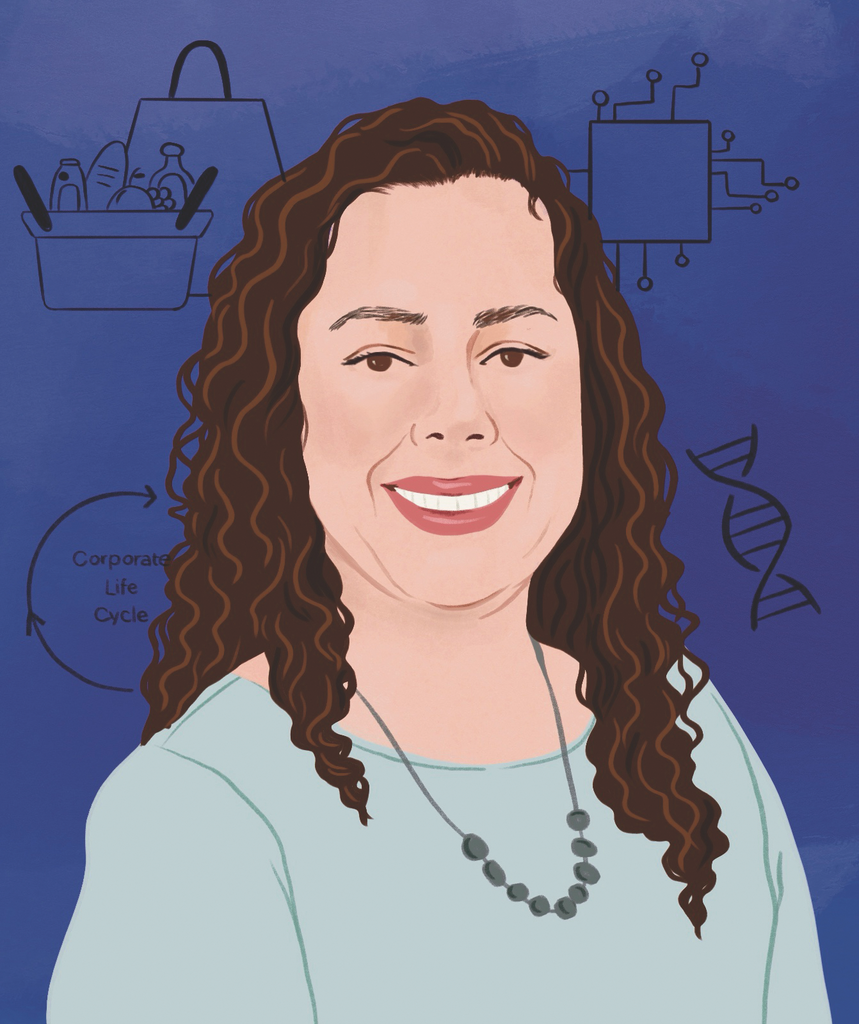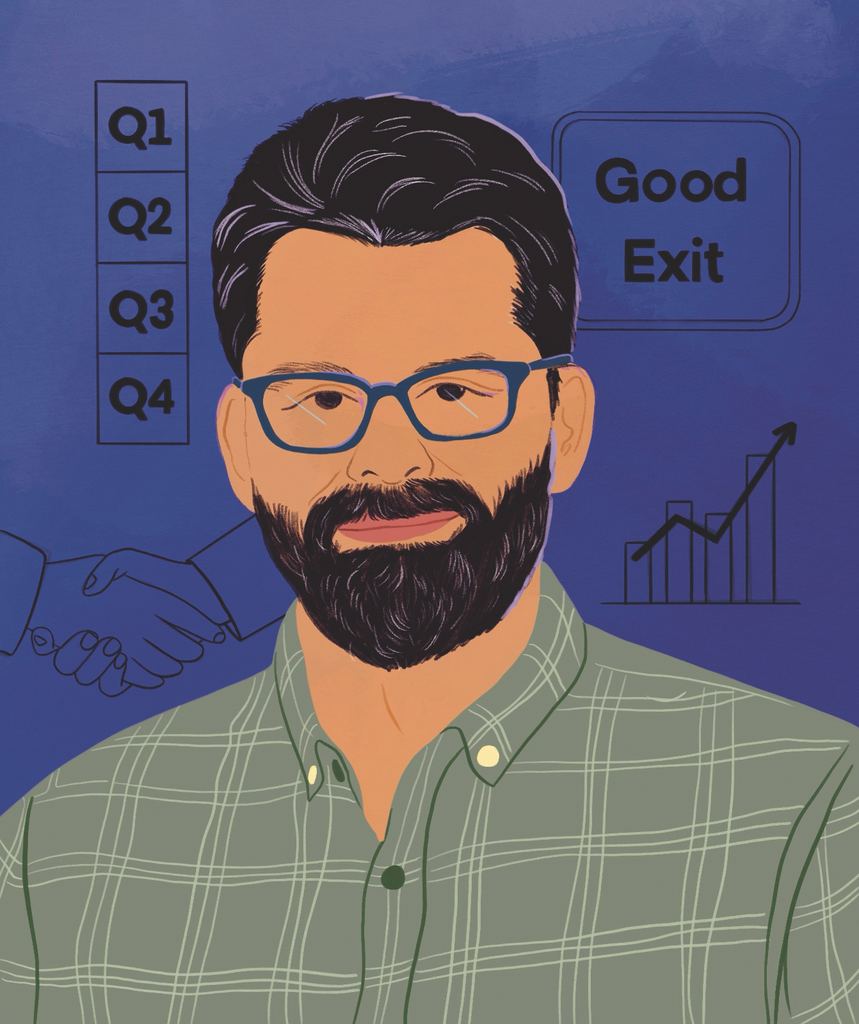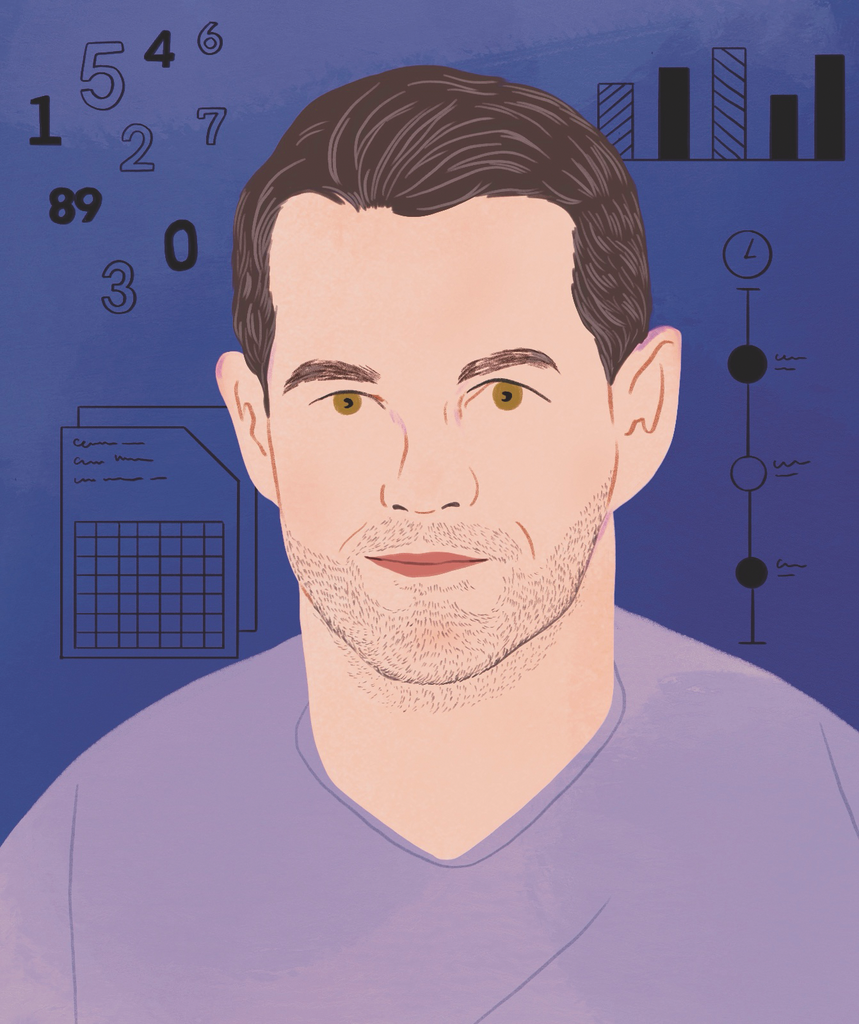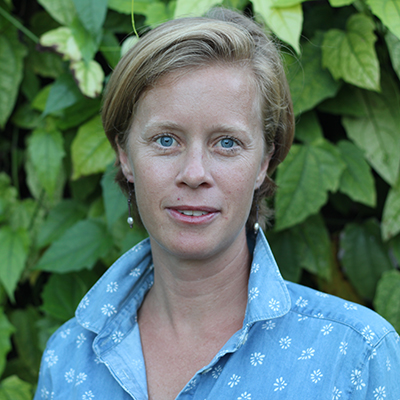Looking for a Way Up and Out

Illustrations by Michelle Mildenberg
Looking for a Way Up and Out
Venture capital investment has trended down since its peak a few years ago, but faculty and alumni say the cyclical nature of the market means happier days are ahead.
For several years at Holland & Hart, the Denver law firm where Lauren Schoeffler (’13) is a partner working on venture capital financing and other corporate matters, there was an entire class of associates who had never handled a “down round,” where the value of a business declines from the previous investment period.

“My colleague and I were joking about it recently,” says Schoeffler. “We had a whole generation of people who only knew good times.”
Not anymore.
Since its peak in 2021, almost everything about the venture capital market has been trending down except down rounds. Those are up. So are painful pay-to-play deals, where investors must provide additional funding or lose some of their ownership rights. Also up: initial public offerings and acquisitions in which a company is valued below everyone’s original expectations. Schoeffler calls those “sad exits.”
“Good exits were hard to come by for companies in 2023,” she says. “I’ve become something of a specialist in the not-so-fun exits where everyone but the buyer is disappointed.”
Schoeffler’s experience isn’t unique. After years of low interest rates, when start-ups notched higher and higher valuations from investors looking for a way to generate big returns on the Next Big Thing—including during the pandemic—deals began to slow and sour around the end of 2022. BU Law alumni and faculty who work with emerging companies say most investors and founders are still trying to find their footing.

Eventually, they will. That’s the nature of the markets, the practitioners say. Prithvi Tanwar (’08), a partner at Polsinelli in Boston, points out that things began to improve last year: in the second quarter, there were more flat rounds—valuations stayed stable from one funding round to the next—than in the previous quarter, and “glimmers of normalcy” even appeared in the third quarter.
“Flat rounds were the new up round,” Tanwar jokes.
“Wild Time”

Despite concerns of a recession and the fact that millions of people lost their jobs, the pandemic turned out to be a boon for much of the economy, including venture capital. Interest rates were low, so investors were looking for profitable places to put their money and often found themselves competing to invest in promising companies, causing valuations to skyrocket. According to Tony Lewis (’12), cofounder of Aumni—a data analytics company that analyzes the venture capital industry and was recently acquired by JP Morgan—valuations around the first quarter of 2022 were up 100 percent over the prior year.
“There was more supply of cash than quality companies,” Lewis explains. “Valuations just went up so fast.”
Schoeffler, who had previously worked in biotech financing, moved to Holland & Hart in 2020 to work in the firm’s consumer packaged goods practice. When the pandemic hit, “everyone thought it was going to be a tough time,” she says. “But, at least in my industry, things were going crazy. Money was flooding in. It was a wild time.”
A variety of factors contributed to the post-pandemic slowdown in the market, including rising interest rates—which made safer investments more attractive—and uncertainty in general about the markets and a war-torn world. There was also just a sense among investors that things couldn’t keep growing and growing and growing.
“People realized they were behaving irrationally based
on factors that were not going to continue indefinitely,”
Tanwar says.
Lewis says he doesn’t like to use words like “bubble”; nevertheless, he agrees, “a lot of people called it a bubble.”
By last year, any bubble there might have been had burst. Valuations for Series B and Series C financing rounds were down 60 percent or more in the first half of 2023, according to Aumni. The number of deals was down 85 percent from the prior peak, and the total capital raised was down 24 percent from the final six months of 2022. One of the biggest deals of 2023 was actually a down round: in April 2023, Crunchbase credited Stripe’s $6.5 billion round with helping prop up the first quarter of the year, but the massive deal actually came with a valuation ($50 billion) almost 50 percent lower than two years prior ($95 billion).
For founders, the question now is how to make the money they have last longer, Lewis says.
“Many founders were betting that the market would bounce back to those high-water marks on a faster timeline,” he adds. “I don’t think that’s coming.”

Tom Patten, a lecturer and clinical instructor in the Venture & Finance group within the BU/MIT Student Innovations Law Clinic, puts it this way:
“When that interest rate goes up, investments like treasury bonds become more appealing—now [founders are] competing against those safer investments,” he says.
Indeed, Schoeffler and Tanwar say founders are facing an environment of investors prioritizing the fundamentals of running a business over the potential for future growth.
“It was almost like something flipped,” Tanwar says. “The focus went from acquiring scale to becoming more capitally conservative—that’s almost diametrically opposed to the message a few months earlier, which was ‘Why aren’t you spending my money? Why aren’t you hiring?’”
The fourth quarter of 2022, he adds, was “the season of the RIF [reduction in force].”
Schoeffler agrees. Company founders are often driven by ideas. But ideas aren’t enough in the current environment.
“A lot of founders have had to learn how to run a business in the past year or so,” she says. “Funds are not—at least in the near future—going to be giving money on a prospect, a hope, a dream. They want to see real value.”
Market Cycles
Of course, all markets experience ups and downs, including devastating and long-lasting drops like the one that followed the financial crisis of 2008, the year Tanwar graduated from BU Law.
“It was the deep freeze,” he remembers. “There was no money moving around.”

David Le (’07) also experienced the Great Recession as a young attorney.
“That was very, very hard for many people and businesses,” he says. “And, at the same time, there are corrections that happen on a periodic basis, for better or worse. These things can be very cyclical.”
Le has worked on all sides of the venture capital table. He began his career at Pillsbury in its emerging companies practice; led mergers and acquisitions at Electronic Arts; then joined Lyft to build out its corporate and commercial legal teams, eventually leading the rideshare app’s $2.3 billion IPO in 2019. He also has served as an angel investor and start-up advisor himself and now advises portfolio companies as operating partner at Autotech Ventures, a VC firm that seeks to solve the world’s transportation and logistics challenges with technology.
“Every wildfire is followed by fresh growth.”
For many years, he says, the attitude of some founders and investors was “growth at all costs.”
“Now if you ask investors, ‘Do you value growth or profitability?’ they just say: ‘Yes,’” he says. “The free flow of capital has turned off.”
Instead, investors are being more cautious with their deployable funds and demanding answers to hard questions.
“Deals that we used to do in four or five weeks now take 10 or 12 weeks,” Tanwar says. “There is a ton more diligence, a ton more fixation on risk.”
Value over Valuation
Despite the pain for particular people who are unsuccessful in seeking capital, down markets can have positive effects, too, Tanwar says.
“Every wildfire is followed by fresh growth,” he says. “When the economy crashes and there are layoffs, there is a massive amount of uncertainty. But, in all of that, some really smart people are now given the opportunity to think about building things for themselves.”
Also, when investors prioritize businesses that are focused on fundamentals, genuinely valuable companies have a better chance of success.
“Slowdowns can be a positive,” Tanwar explains. “They can separate valuable products from people who just raise a lot
of capital.”

Vivian Etter is a lecturer and clinical instructor who heads the Venture & Finance group in the BU/MIT clinic. She points out that venture capital financing is extremely rare no matter how the market is doing—less than one percent of companies receive funds from VCs in a given year, according to sources like the Kauffman Foundation, a nonprofit that supports entrepreneurship and diversity in the venture capital field.
“We get approached as though VC funding were the norm, when statistically, it’s more of an outlier,” she says. “Funders are looking for that sexier product—it’s really about something that’s innovative and unique and can be scaled up well.”
But even in down markets, good ideas—or the trendiest ones—will still attract investors. For now, all VC roads lead to artificial intelligence (AI). According to Aumni’s report, the median post-money valuation among AI-related companies was higher than software companies generally in the first half of 2023. “AI has experienced a massive upswing,” Tanwar says. “It’s really countercultural in terms of the broader patterns of VCs. You have funders really pushing for more revenue discipline, and, on the flip side, they are pouring money into these AI companies that have very little to show so far.”
(Case in point: Schoeffler says she represents a fund that is looking to invest in “anything AI-related.”)
Despite the challenges of the current market, practitioners say working with emerging companies is a reward in and of itself.
Le says he has spent his career trying to be “in the room” where decisions are made about what to fund and why. That quest led him to his current role at Autotech Ventures.
“If you’re able to identify an idea that might disrupt an industry, that might change the world—that’s pretty exciting,” he says. “How do you filter for that?”
Patten says he loves his work in the BU/MIT Student Innovations Law Clinic because “you have no idea what’s going to come in your door that day.”
Founders are generally “wildly passionate about what they are doing—they see a need in society that they want to correct and participate in,” he says. “Working with that type of person can be really exciting.”
